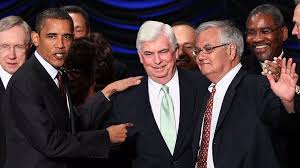 When capital access is denied to businesses, the only way they can survive is often to cut expenses. Sometimes the only way to cut expenses is by eliminating employees. Pennngton County had 40,000 ton of gravel ground on our ranch this summer. That is a LOT of gravel. The grind was done by a small business person who previously had 20 employees. This time he did the entire grind by himself. That was one businessman’s solution, but it was brutal to employment and the only way he was able to survive. If you are aware of small businesses in your area, you will discover a distressing number of additional examples.
When capital access is denied to businesses, the only way they can survive is often to cut expenses. Sometimes the only way to cut expenses is by eliminating employees. Pennngton County had 40,000 ton of gravel ground on our ranch this summer. That is a LOT of gravel. The grind was done by a small business person who previously had 20 employees. This time he did the entire grind by himself. That was one businessman’s solution, but it was brutal to employment and the only way he was able to survive. If you are aware of small businesses in your area, you will discover a distressing number of additional examples.
Now, for how I was personally impacted by the Dodd-Frank regulations. Several years back we had a five-year renewable ranch mortgage that came up for renewal. The ranch was a startup business. Income was limited during the first few years as we built up a cattle herd, and expenses were very high as they always are for startup businesses. That did not come as a surprise to me, because I have been involved in other startup businesses. Our approach was to fund startup expenses through sale of property that we had in Virginia and continue such funding until the ranching enterprise could stand on its own. We did not have a HISTORY of meeting the arbitrary standard of income now required, which must be a minimum of 1.25 times expenses. This is an impossibly high hurdle for most small businesses and is quite remarkable for a startup business. The only way we had a possibility of achieving this number on the ranch was to let our last ranch employee go, for me to go back to work full-time + without pay, and to literally stop every nonessential expense. Nonessential expenses would be things like building more fence, further water development, additional equipment, any improvements to the buildings or facilities, planting more trees, putting in shelter belts, building dams, and seeding fallow ground back to forage. Undertaking any of these projects would contribute to the local economy. All of our payments were made on time. We had a 44% equity position in the ranch (subsequently demonstrated to be nearly 70%). Even so, the new regulations put our loan renewal in jeopardy. We were given a one year extension on the loan rather than the expected five year renewal. Then I started being called in every three months for a painstaking review of every minute financial detail. My reviewer was a young banker who was understandably petrified about losing his job if regulators deemed my loan or my global financial position to be in noncompliance. They were at best borderline and a strong equity position meant nothing. We were doing everything humanly possible to improve the new income to expense mandates. With the writing on the wall, the likelihood of having the loan not renewed and a forced sale or foreclosure was obvious. So we did the only thing we could do–with property not selling in Virginia, we continued to let go employees to cut expenses and help our critical “global” position. We ultimately went from twelve employees to three because we had absolutely no choice. With an incredible investment of time and energy at a time when I personally needed to be doing something productive, I finally found another banker who was less intimidated by legions of regulators and who was also willing to take into account our remaining property in Virginia. I was one of the fortunate who survived, but it was not fun. Even with the new banker, changes in the economy and the weather risked my income dropping and my ranch loan becoming nonconforming, leading to a forced sale or foreclosure even though all loan payments were made on time and we had an extremely solid equity position.
I have always been a long-term investor. My niche was to purchase properties that needed work and continue to plow energy and money back into those properties to make them better. Initially I could only buy rundown property that the owners had to finance because no bank would touch them. Over time I was able to get additional bank financing, but that financing was mostly with renewable loans. Once property was in excellent condition, I was finally able to get long-term financing on many of the single family units. My approach of constantly plowing money back into the properties certainly didn’t help cash flow. Under the Dodd-Frank rules this approach became impossible even though each year it had previously resulted in property improvements and actually made existing loans more secure. It also contributed substantially to the local economy through both employment and material purchases.
The Dodd-Frank regulations not only put existing renewable bank loans in jeopardy, they had other significant repercussions. Let’s assume that we sold another property in Virginia and thereby generated additional cash reserves. We wanted to hire additional help on the ranch and could readily use another full-time person. We have many projects that could be started immediately. Too bad. If we hired that additional person, even if we had the resources to do so, our ranch expenses would go up. As mentioned above, we actually let our remaining ranch employee go when I fully realized the implications of keeping him. If we did any of the additional projects that we would like to do, our expenses would go up. If our expenses go up, either through employment or materials, our loan would not meet the new arbitrary standard, would not be renewed, and we would be forced to sell. That is the Dodd-Frank Act as it actually exists as opposed to the mythological Act still adamantly supported by leaders of one political party. Can anyone explain to me how regulations that literally have prevented me from hiring more help or from purchasing more material have a positive impact on employment or on our economy? Can everyone see why the inducement of a tax break for hiring additional people (one of our government’s inane solutions to the unemployment problem) provided no incentive whatsoever for us to hire, knowing that we would then no longer meet the arbitrary new financial standards with that additional expense? But wait. I could not spend the money for improvements on our Virginia property either because my global cash flow was also under scrutiny; we had to absolutely minimize expenses there as well. That relates directly to employment (where we are now at an all-time low) and material purchases, the only two expenses over which we have immediate direct control. Rather than use the cash resources in a way that could have a positive impact on the economy, I could chose between putting the money into bank savings at minuscule interest or paying off some existing mortgages or gambling with the stock market. If I retired an existing mortgage, that bank looses a solid customer paying 7% interest and then has additional money available to not loan. Note that debt is being paid down across this country and that banks have an all-time surplus of cash. In light of my experience, is that surprising? Handing money over to a bank that can not loan that money does nothing to contribute to a growing economy. Yet that is what we would literally be forced to do with any sale proceeds. Were anyone to set about designing a way to shut our economy down, it would be hard to improve on the Dodd-Frank Act. That Act remains in full force.
Note that I have not touched on the reasons most frequently given for investors setting on the sidelines. A business able to operate from cash reserves, with an excellent cash flow, and with no renewable loans on the books will not be impacted by the new regulations and will be doing just fine as long as the economy does not impact their income. That helps explain why our economy did not totally shut down. Unfortunately, most businesses and investors require loans, and those loans are subject to periodic review. The banks that make them are in turn now subject to massive new regulations. If you can’t project what your taxes will be or what government mandated health care will cost and you don’t really know what the economy will do so you can’t predict income, can you really afford to gamble by hiring employees and investing additional money? The economy can directly impact your income. Employee and health care expenses will directly impact your expenses. Because of the new regulations, if you fail to meet the new income-to-expense standards your loan can and will be called even if all of your bills have been paid on time. This is economic insanity. Through absolutely no fault of your own you could simply lose everything that you invested even though you have paid all your bills and mortgages on time! Does this really seem like a fertile investment climate? Investing always bears risks, but the regulations now increase those risks in the myopic Draconian way that only our government could devise. This is the same government that has been baffled by the unwillingness of investors to actively participate in the economy.
*** Gary A. Howie MSc, PhD *** is business owner/rancher and a Life & Liberty News contributor


thanks for these – am copying them off for easier reading and to share with my husband.